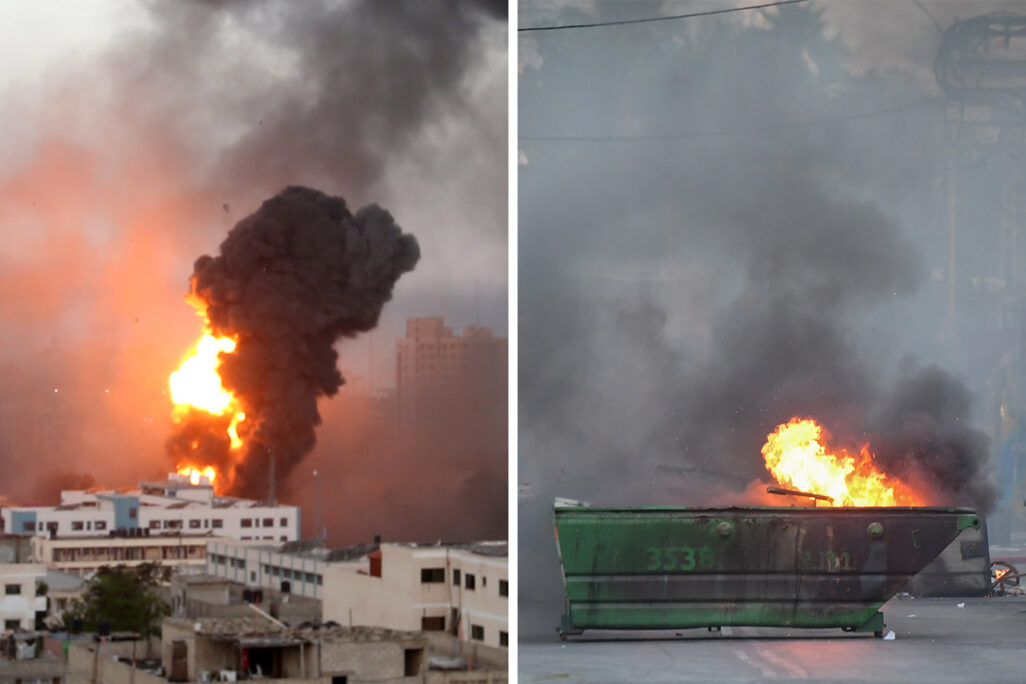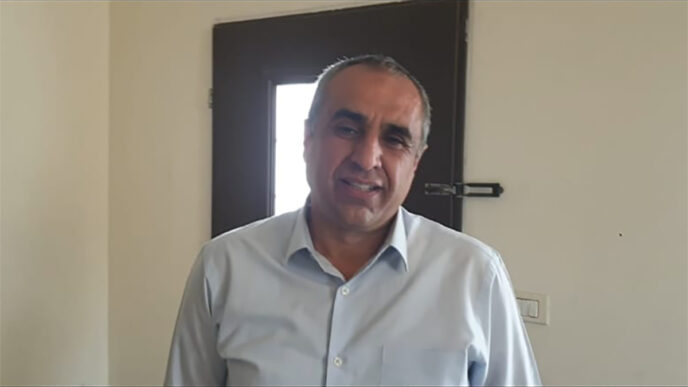
The past week has seen a serious escalation in rocketfire onto southern and central Israel, and massive airstrikes in Gaza. In addition, an unprecedented burst of violence incidents has flooded many of the mixed cities previously representing coexistence between Arabs and Jews in Israel – Lod, Ramle, Yafo, Haifa and Akko.
The violence is perpetrated mainly by groups of Arab vigilantes targeting Jewish people and property, and organized groups of Jewish extremists, affiliated with the La Familia and Lehava organizations, targeting Arab people and property.
Davar spoke to experts and community leaders in an attempt to understand the undercurrents erupting inside the Arab communities in Israel.
Arab leaders speak out against injustice, and demand end to violence
According to Arab Israeli leaders, much of the violence from Arabs has long standing causes.
"The discrimination and alienation towards Arab society, the spread of violence, the lack of treatment and neglect, poverty, subpar education, all of these things already existed. The recent events in Sheikh Jarrah and al-Aqsa and the murder [of Arab youth Musa Hasouna by Jewish extremists] in Lod led to the explosion," said Modar Younes, chairman of the Council of Arab Authorities and the head of the local council of Arara.
According to him, "there is no doubt that there is serious anger among the young people, and not just the young people.”

Amjad Shavita, co-director of the Sikui organization for promoting partnership between Jews and Arabs, suggests looking at events through broader trends of government policies that undermine the delicate tension in which Arab citizens live. In particular, he mentions the ongoing economic inequality between Jewish and Arab society in Israel, as well as identity, discrimination and polarization.
"Most members of Arab society see their identity as complex, both as belonging to the Palestinian people and as citizens of Israel. Over the years, they have managed to find the balance between the two components. The Israeli government is trying to challenge the right of Arab citizens to hold such complexity,” he said.
“I think these things accumulate, violence for example. Everyone knows about the violence inside Arab society and it hasn’t been properly managed [by the government],” Shavita continued. “It creates a feeling in Arab society that things are lawless. Even when talking about civic questions, there is a cumulative sense of discrimination on the basis of national identity. All of these challenges add to this tension and stress that is exploding these days.”
Added to all this are the events of the past week, which raise the level of anger and touches on already sensitive spots.
"These are crazy times," Shavita said. "Seeing the families in Sheikh Jarrah under threat of evacuation in favor of violent settlers is infuriating, seeing it expand to Al-Aqsa, it hurts my national and human religious feelings. In the last week, it has slipped into the mixed cities, where the experience is very difficult. I see violence, and the feeling is of fear, anger and frustration.”
“What distinguishes what is happening from previous protests is the damage to holy sites, which drives people out of control and allows emotions to take over,” Shavita went on. “To see soldiers firing and throwing grenades in al-Aqsa is offensive, and it spurs inappropriate violence, which is unworthy of the just struggle of Arab society.”
Younes made it clear that he and other Arab Israeli political leaders are calling for calm in the streets. He describes a meeting of the Israeli Arab Monitoring Committee convened on Tuesday, after Hasouna was shot dead in Lod by a Jewish resident during clashes in the city.
"The discourse was clear," he said. "We said that we call for demonstrations, but non-violent demonstrations. Do not harm property, and certainly not humans.”
On the same day, Younes spoke with President Reuven Rivlin. A statement issued by the President after the call read that the President told Younes: "I urge you to do everything you can to calm tempers. The people of Israel, Jews and Arabs, should hear the Arab leadership make a firm and clear stance against the rampant violence, against the damage to the synagogues, against this savage rampage.”
Younes expressed disappointment with this statement, calling it unequal. He maintained that not only Arab leadership must calm tempers.
"In the conversation with me, the president called for an end to the violence and extremism on both sides. We as leadership call for nonviolent demonstrations. On the other side, I did not see anyone trying to calm people down, everyone was bickering.”
“There needs to be an honest conversation,” he said. “We understand that the day after, we will both still be here. We need a respectful discourse, a discourse of equality, he needs to treat me as an equal citizen.”
“We are going through a difficult time,” Younes continued. “We are all afraid. We try to calm down, expecting the other side not to add fuel to the fire. It is the responsibility of the state to stop the extremists, to prevent provocations.”
Shavita refuted a media claim that Arab leadership has not adequately called for calm, citing that many more Arab Knesset members and local political leaders have called for de-escalation as compared to Jewish lawmakers and politicians.
Still, the calls for calm did not immediately calm the riots.
"Young people hear the calls, but the level of frustration and anger is so high that they no longer care about the calls for calm from the political leadership,” Shavita explained. “There is a certain percentage, in my opinion very small, of very frustrated people who think such calls are cooperation with the establishment.”
Shavita maintained that although more voices should call for nonviolence, it does not mean the protest itself should end.
"This protest must be legal and legitimate, not taking the law into their own hands, neither on the part of the Jews nor on the part of the Arabs,” he said. “There is talk that the Jewish leadership will speak to the Jews, and the Arab leadership will speak to the Arabs. I think a joint call to keep the law and the fabric of life, will be greatly effective.”
Exactly such statements from Jewish and Arab mayors in the northern, Negev and Sharon areas came out this week.
However, Shavita demands a long-term answer to the injustices.
“Even after the redress of injustice, as long as the occupation continues, the gaps will continue,” he said. “We must move forward in peace with the Palestinians. As soon as the State of Israel settles its ties with the Palestinian people in the Occupied Territories, we will not continue to live with the feeling that our state is occupying our people.”
"Hamas exerts pressure on Israel through demonstrations within [Israel’s] territory"
According to Dr. Ido Zelkovich, head of the Middle East Studies Program at Emek Yizrael Academic College, research fellow at the Ezri Center for Iran & Persian Gulf Studies at the University of Haifa and at the Mitvim Institute, a progressive foreign policy think tank, this is not “just another round” of violence of the sort that has been common in Israel in recent years.
Zelikovich believes that much of the internal unrest on the part of Israeli Arabs has been provoked deliberately by Hamas, as part of a broader strategy to unite Gaza, the West Bank and East Jerusalem in its public support of the terrorist organization.
“We are in a situation in which Hamas exerts pressure on Israel through demonstrations within [Israel’s] territory, led by Israeli Arab citizens, Hamas does not conduct the demonstrations directly, but its propaganda machine knows how to capitalize on religious motives and motivate groups of Israeli Arabs to take action,” he explained.
“From a strategic point of view, once the Israeli security forces are engaged in confrontations with young people from here [Israeli Arabs], it makes it difficult for the security forces to conduct a campaign with [Gazans],” Zelikovich explained. “When going into a campaign [against Gaza], there must be peace in the home front and that is not currently the situation.”
“Unfortunately, these events also confirm the belief that many Jewish Israelis hold, that we have no choice but to ‘live by the sword,’ and that we will always be a ‘foreign element’ in the region. That we will continue to live in rounds of endless wars.”
To Kobi Michael, senior research fellow at the Institute for National Security Studies, an independent think tank associated with Tel Aviv University, the clashes with Hamas are not as troubling as Arab-Jewish riots in Lod.
“These are Israeli citizens, and this is happening at home. In the face of a violent uprising of Israeli citizens like this one, you cannot act the way you would act if you were facing a [foreign] enemy,” he said. “The problem is that they have already burned three synagogues, thrown Molotov cocktails at houses, and set dozens of vehicles on fire. The police can’t handle this.”
Tensions between Arab and Jewish Israelis in Lod and other mixed cities are not a new phenomenon. Michael attributes the intensity of the past few days’ reaction to rising anti-Zionist sentiment: “We have to remember that these are groups of very militant young people with negative feelings towards the state.”
Michael is pessimistic about how the recent violence will affect the relationship between Jews and Arabs within Israel.
“The events may reverse important processes that have taken place,” he said. “Everything we thought about the ‘Israelization’ of the Arabs in Israel, the Arabs’ desire to integrate, the existence of a political party advocating for the promotion of Arab interests in cooperation with Zionist parties [Ra’am] — there is no chance it will happen now under these conditions.”
“The image that the Arabs in Israel are joining forces with an enemy from the outside, working against the state, and engaging in barbaric and murderous violence is something that Arab society will pay a very heavy price for,” he continued. “There are very bad days ahead. We will witness abhorrent politics and a very bad situation both in the Knesset and on the streets, in hospitals, in universities and so on.”
Like Michael, Zelkovich understands the riots in Lod to signal a changing dynamic between Israel and its Arab citizens.
According to him, "the fact that Israeli Arabs identify with their people in the Gaza Strip, or with Islamic values, is natural. But in recent days, red lines have been crossed in the relationship between Israel and its Arab citizens. Anyone who walks around with a Molotov cocktail isn’t planning on making a campfire – he’s planning to harm human life and property.”
He insists that even though "the right to demonstrate is a sacred democratic right,” the State of Israel “must not accept the fact that young Arabs are deciding to break the law, to challenge symbols of government and, moreover, to engage in violence that endangers human lives.”
In Zelkovich’s view, the response to the riots must be swift and stern, with the police taking immediate action to arrest anyone involved in rioting, and the legal system cracking down in its punishments. This response would deter this type of violent crime, he says.
According to Zelikovich, the deteriorating relationship between Jews and Arabs paint a grim picture for a future of peaceful coexistence in a potential binational state.
“In the long run, these events illustrate the importance of separation from the Palestinians,” he said. “[There would be] violent struggle and friction between the two populations, neither of which are interested in living in such a political model. The current situation is just a taste of the civil war that would come to exist if a state is established according to the [binational] model offered by parts of the radical left and the extreme right.”






